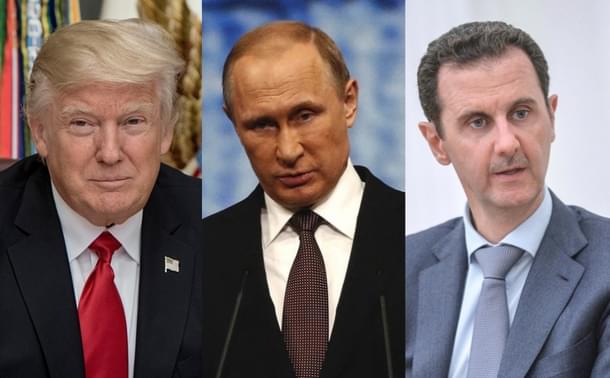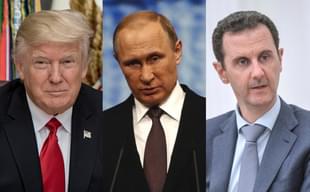World
Tillerson’s Abrasive Performance On Syria Is A Textbook Example Of What Trump Must Avoid
Ted Galen Carpenter
Apr 15, 2017, 03:45 PM | Updated 03:45 PM IST
Save & read from anywhere!
Bookmark stories for easy access on any device or the Swarajya app.


Secretary of State Rex Tillerson arrived in Moscow this week for his previously scheduled official visit with Russian officials. His journey came at a time when the chill in bilateral relations is especially acute following the US missile strikes on Syria in response to the Assad government’s alleged use of chemical weapons. Kremlin leaders were extremely annoyed at Washington’s action, and they hinted that Tillerson’s expected meeting with President Vladimir Putin might have to be canceled. Instead, his talks would be confined to sessions with his counterpart, Foreign Minister Sergei Lavrov.
The Russians relented at the 11th hour, but to describe the Tillerson-Putin meeting as tense and contentious would be an understatement. The same was true of his interaction with Lavrov. Not surprisingly, Syria policy was the main irritant. Lavrov set the tone at the welcoming ceremony, which usually is a polite, vacuous ceremony.
Instead, he used the occasion to direct pointed criticism at the Trump administration. Not only did he express concern about “ambiguous and contradictory ideas” coming out of Washington regarding international affairs generally, but he added, “apart from words, we saw some very alarming actions regarding the unlawful attack in Syria.”
Tillerson did not retreat from the administration’s newly adopted hardline policy regarding that country. Indeed, he insisted that Russia sever its alliance with Bashar al-Assad’s government. Even before arriving in Moscow, Tillerson stated that Russian leaders needed to face the reality that the Assad family’s rule had reached an end. Both Putin and Lavrov flatly rejected that demand. Foreign Ministry spokesperson Maria Zakharova stated bluntly that “there is no use giving us ultimatums. This is simply counterproductive.”
Beyond resentment at Washington’s brusque behaviour, the Putin government’s stance reflects major policy differences between the two countries. Russian officials warn that ousting Assad would risk making Syria yet another playground for ISIS and other radical Islamist factions. That fear is well-founded. Despite Washington’s longstanding search for “moderate” Syrian rebels, fighters with that orientation are few on the ground and, with the exception of the Kurdish units in the Syrian Democratic Forces, they lack meaningful military capabilities. And the Kurds are pursuing their own agenda – securing a de facto independent state in northern Syria, just as they achieved in Iraqi Kurdistan following the US-led overthrow of Saddam Hussein.
The Russians are right. Although Assad is a brutal dictator, removing him would create a dangerous power vacuum in Syria. Even if ISIS did not succeed in filling that vacuum, most of the US-backed rebels (with the exception of the secular Kurds) are nearly as radical. The leading, most powerful, non-ISIS faction is Tahrir al-Sham, formerly the Nusra Front, al-Qaeda’s affiliate in Syria. Together with its smaller, equally Islamist allies operating under the umbrella organisation Ahrar al-Sham, the Nusra militants would likely dominate any post-Assad government.
The only way to prevent such an outcome would be to send a large contingent of US forces to occupy the country, and no sane American should embrace that option.
Although the Syria issue was the greatest source of animosity in Tillerson’s meetings, it was not the only one. Frictions also resurfaced regarding Crimea, Moscow’s alleged cyber espionage against the United States, the Kremlin’s reported flirtation with the Taliban in Afghanistan, and NATO’s new military deployments in Poland and the Baltic republics. Although the joint closing press conference sought to portray the discussions as a constructive, albeit candid, exchange of views, it was difficult to hide the reality that US-Russian relations appear to be at their worst level since the end of the Cold War. Even Tillerson conceded that the relationship was “at a low point” and needed to be improved in the interests of both countries.
The ongoing chill should deeply disappoint all Americans. Given Donald Trump’s conciliatory comments regarding Russia during the 2016 presidential election campaign, there was the widespread expectation of a US-Russia rapprochement.
Indeed, Trump and his foreign-policy team have had to fight off a concerted campaign by both neoconservative Republicans and hawkish Democrats who accuse them of being Putin’s puppets. Perhaps the administration’s new confrontational stance toward Moscow is an attempt to erect a defence against that assault. If so, it is likely to be a futile effort. Trump haters are not going to be placated by belated hawkish posturing against the Kremlin.
Even more worrisome is the substantive damage to an already troubled bilateral relationship. The last thing that Americans need is another cold war with the one nation that has the military capability to eradicate American civilisation if that confrontation ever turned hot. We were fortunate to have survived the initial cold war without it erupting into a horrifying conflagration. We might not be so lucky this time around.
The Trump administration needs to return to its original course and seek to improve relations with Moscow. Tillerson’s abrasive performance is a textbook example of what to avoid.
This piece was first published in The American Conservative and has been republished here with permission.
Ted Galen Carpenter, a senior fellow in defense and foreign policy studies at the Cato Institute, is the author of 10 books and more than 650 articles on international affairs.





